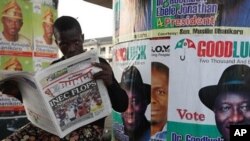Nigerians head to the polls Saturday after several delays for the first of a three-part general election, though some parts of the country will have to wait a little longer to cast their votes.
Most of Nigeria's population will begin voting Saturday for members of parliament despite lingering questions surrounding the poll's credibility after several false starts.
The poll, originally slated for April 2, was pushed back twice by the Independent National Electoral Commission after problems arose distributing voting materials to the country's 120,000 polling stations.
INEC announced Thursday an additional delay for about 15 percent of the country's electoral districts, which will now have to wait until April 26 to cast their ballots in Senate and House races.
The delays have frustrated many voters in Nigeria, a country with a troubled election history since the end of military rule in 1999.
President Goodluck Jonathan sought to allay voters' concerns in a nationwide address this week while also defending the INEC electoral chief, Attahiru Jega. "Let me reiterate that the federal government is fully committed to the independence of INEC and to the conduct of free and fair elections in the country," he said.
Jonathan is running in presidential polls scheduled for April 16 against 18 other candidates. State polls are scheduled the week after. Jonathan, the former vice president, became head of state nearly a year ago upon his predecessor's death in May 2010.
An opinion survey released this week showed Jonathan leading with 62 percent ahead of his closest rival, former military ruler Muhammadu Buhari, who garnered 24 percent. The Action Congress of Nigeria candidate, Nuhu Ribadu, trailed with six percent.
An Africa analyst, J. Peter Pham, says the optics of this election will be just as important as who gets elected. "[In] 2003, the cheating was massive, and 2007, arguably one of the worst elections ever run anywhere. With that as the backdrop, even the most well run best effort is going to draw suspicion from people. Nigeria needs a government that's not only democratically elected, but perceived that way, and doesn't have that shadow cast over its legitimacy," he said.
Pham says questions remain about the security of the ballots that were already cast last Saturday before INEC officially postponed the elections. Millions cast their votes in areas such as Lagos and Kaduna, and may feel cheated if their votes are not secured.
A program officer at the National Endowment for Democracy, Oge Onubogu, says despite the logistical obstacles, an encouraging aspect surrounding these elections has been the enthusiasm among Nigeria's youth.
"We've seen so much interest, especially among the young population of Nigeria. The young people are just so interested in the process, actually going up the extent of mobilizing themselves in domestic election monitoring teams to go out there and see what is really happening," Onubogu said.
Onubogu says Nigeria's youth, who make up a significant portion of the country's 70 million voters, are seeking to turn a new page for democracy.






